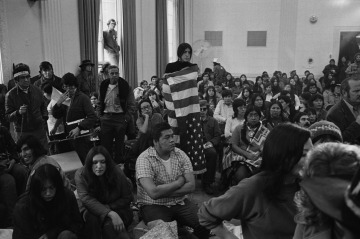1972: ‘Trail of Broken Treaties’ raises environmental health concerns
American Indian leaders and activists organize a nonviolent protest to bring attention to issues affecting American Indians. More than 600 people travel in the “Trail of Broken Treaties” in a caravan of buses, cars, trucks, and campers to Saint Paul, Minnesota. There, Hank Adams, an Assiniboine activist, writes the Twenty Points, one of which states that lack of sanitary sewers and clean drinking water on reservations is killing American Indian children. The meeting in which the activists plan to present these points to President Richard Nixon never occurs.
“Death remains a standard cure for environmentally induced diseases afflicting many Indian children without adequate housing facilities, heating systems, and pure water sources. Their delicate bodies provide their only defense and protection and too often their own body processes become allies to the quickening of their deaths, as with numerous cases of dysentery and diarrhea. Still, more has been spent on hotel bills for Indian-related, problem-solving meetings, conferences and conventions than has been spent on needed housing in recent years.” —Hank Adams, Assiniboine activist, in the Twenty Points
- Theme
- Federal-Tribal Relations, Native Rights
- Region
- California, Great Basin, Great Plains, Northeast, Northwest Coast, Plateau, Southeast, Southwest
Native American participants in the Trail of Broken Treaties occupy an auditorium at the Bureau of Indian Affairs in Washington, D.C. in November, 1972. Hundreds of protestors occupied the building in the nation's capital as part of a week-long effort to drawn attention to issues affecting American Indians.
Courtesy Bettmann/Corbis
